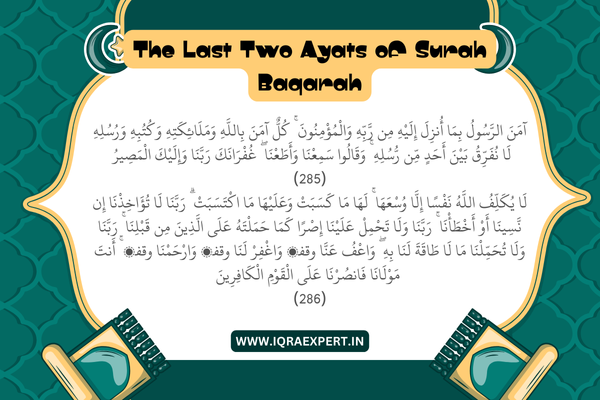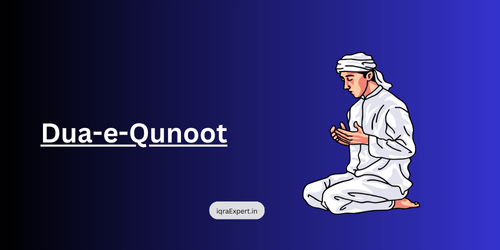The Last Two Ayats of Surah Baqarah: Unlock Divine Protection

Table of Contents
Last Two Ayats of Surah Baqarah
Ayat 285
ءَامَنَ ٱلرَّسُولُ بِمَآ أُنزِلَ إِلَيْهِ مِن رَّبِّهِۦ وَٱلْمُؤْمِنُونَ ۚ كُلٌّ ءَامَنَ بِٱللَّهِ وَمَلَـٰٓئِكَتِهِۦ وَكُتُبِهِۦ وَرُسُلِهِۦ لَا نُفَرِّقُ بَيْنَ أَحَدٍۢ مِّن رُّسُلِهِۦ ۚ وَقَالُوا۟ سَمِعْنَا وَأَطَعْنَا ۖ غُفْرَانَكَ رَبَّنَا وَإِلَيْكَ ٱلْمَصِيرُ ٢٨٥
The Messenger ˹firmly˺ believes in what has been revealed to him from his Lord, and so do the believers. They ˹all˺ believe in Allah, His angels, His Books, and His messengers. ˹They proclaim,˺ “We make no distinction between any of His messengers.” And they say, “We hear and obey. ˹We seek˺ Your forgiveness, our Lord! And to You ˹alone˺ is the final return.”
Ayat 286
لَا يُكَلِّفُ ٱللَّهُ نَفْسًا إِلَّا وُسْعَهَا ۚ لَهَا مَا كَسَبَتْ وَعَلَيْهَا مَا ٱكْتَسَبَتْ ۗ رَبَّنَا لَا تُؤَاخِذْنَآ إِن نَّسِينَآ أَوْ أَخْطَأْنَا ۚ رَبَّنَا وَلَا تَحْمِلْ عَلَيْنَآ إِصْرًۭا كَمَا حَمَلْتَهُۥ عَلَى ٱلَّذِينَ مِن قَبْلِنَا ۚ رَبَّنَا وَلَا تُحَمِّلْنَا مَا لَا طَاقَةَ لَنَا بِهِۦ ۖ وَٱعْفُ عَنَّا وَٱغْفِرْ لَنَا وَٱرْحَمْنَآ ۚ أَنتَ مَوْلَىٰنَا فَٱنصُرْنَا عَلَى ٱلْقَوْمِ ٱلْكَـٰفِرِينَ ٢٨٦
Allah does not require of any soul more than what it can afford. All good will be for its own benefit, and all evil will be to its own loss. ˹The believers pray,˺ “Our Lord! Do not punish us if we forget or make a mistake. Our Lord! Do not place a burden on us like the one you placed on those before us. Our Lord! Do not burden us with what we cannot bear. Pardon us, forgive us, and have mercy on us. You are our ˹only˺ Guardian. So grant us victory over the disbelieving people.”
Surah Al-Baqarah Ki Aakhri Do Ayat Hindi Mein:
आयत 285:
आमना र-रसूलु बिमा उनज़िला इलैहि मिर्रब्बिही वल-मुमिनून।
कुल्लुन आमना बिल्लाहि व-मलाएकतिहि व-कुतुबिहि व-रुसुलिहि।
ला नुफ़र्रिक़ु बैना अहदिं मिन रुसुलिहि।
वा कालू समिआना वा अतआना ग़ुफ़्रानक रब्बना वा इलैकल मसीर।
आयत 286:
ला युकल्लिफ़ुल्लाहु नफ्सन इल्ला वुस्अहा।
लहा मा कसब्त वा अलैहा मा اكتسبत।
रब्बना ला तुआखिज़्ना इन-नसीना औ अ-ख़ता’ना।
रब्बना वा ला तहमिल अलैना इस्रं कमा हमल्तहु अलल्लज़ीना मिन-क़ब्लिना।
रब्बना वा ला तुहम्मिल्ना मा ला ता’कत लना बिह।
वा-फ़ुअन्ना वा ग़फ़िर लना वा रहम्ना।
अन्त मोलाना फ़ंसरना अलल-क़ौमिल काफ़िरीन।
Surah Al-Baqarah Last Two Ayats in English:
Ayat 285:
Aamanar-Rasoolu bimaa unzila ilaihi mir-Rabbihi wal-mu’minoon.
Kullun aamana billaahi wa malaa’ikatihi wa kutubihi wa Rusulih.
Laa nufarriqu baina ahadim-mir-Rusulih.
Wa qaaloo sami’naa wa ata’naa ghufraanaka Rabbanaa wa ilaikal-maseer.
Ayat 286:
Laa yukalliful-laahu nafsan illaa wus’ahaa.
Lahaa maa kasabat wa alaihaa maktasabat.
Rabbanaa laa tu’aakhiznaa in naseenaa aw akhta’naa.
Rabbanaa wa laa tahmil alainaa isran kamaa hamaltahoo alal-lazeena min qablinaa.
Rabbanaa wa laa tuhammilnaa maa laa taaqata lanaa bih.
Wa’fu anna waghfir lanaa warhamnaa.
Anta maulaanaa fansurnaa ‘alal qawmil kaafireen.
Reciting the Ayats from Surah Al-Baqarah holds immense spiritual value. It’s a timeless act that connects us to Allah’s words, offering guidance and peace in our daily lives.
English Translation
For non-Arabic speakers, understanding the translation is key. The verses translate as follows:
“Our Lord, do not impose blame upon us if we forget or make a mistake. Our Lord, lay not upon us a burden like that which You laid upon those before us…”
(Provide the full translation here.)
Romanized Version
If you’re new to Arabic, the Romanized version helps in pronunciation. For example:
“Rabbanaa laa tu’aakhiznaaa in naseenaa aw akhta’naa…”
Significance of the Last Two Ayats
The last two Ayats of Surah Al-Baqarah are not just verses but gifts to the believers. Their recitation is a means of spiritual elevation and divine protection.
Spiritual Importance
The Ayats start with the heartfelt supplication “Rabbanaa laa tu’aakhiznaaa” and reflect a believer’s deep connection to Allah. They remind us of Allah’s mercy, justice, and our reliance on Him. These verses are an anchor for faith, especially in challenging times.
Protective Benefits
Reciting these Ayats at night safeguards believers. According to a Hadith, the Prophet Muhammad (PBUH) said, “Whoever recites the last two verses of Surah Al-Baqarah at night, it will suffice him.” They shield us from harm, evil, and despair, making them a daily necessity.
Forgiveness of Sins
Through the words “wa ata’naa ghufraanaka Rabbanaa wa”, we seek Allah’s forgiveness and mercy. Regular recitation cleanses the heart, offering a chance for renewal. The verses remind us that Allah is always ready to forgive when we sincerely turn to Him.
Historical Context
Understanding the historical context of these verses deepens our appreciation and connection to their message.
Revelation Background
The last two Ayats of Surah Al-Baqarah were revealed during a moment of immense significance. Angel Jibreel (Gabriel) brought these verses directly from the heavens to Prophet Muhammad (PBUH) as a gift for the Ummah (Muslim community). Their revelation highlights their unmatched importance in the Quran.
Context in the Surah
These Ayats conclude Surah Al-Baqarah, a chapter filled with guidance for daily life. They summarize key themes: faith, accountability, and divine mercy. This final supplication beautifully encapsulates the Surah’s overall message of reliance on Allah.
Practical Tips for Memorization
Memorizing the last two Ayats of Surah Al-Baqarah can be a rewarding experience. These verses, starting with “Rabbanaa laa tu’aakhiznaaa”, are short yet profound, making them ideal for daily recitation and memorization.
Consistent Recitation Methods
Start by reciting these Ayats every day after prayer. Focus on repetition—saying them three times daily can help you internalize the words. You can also listen to audio recordings by skilled reciters to perfect your pronunciation and Tajweed.
Teaching Others
One of the best ways to memorize is by teaching. Share the Ayats with your family or friends, explaining their meanings and protective benefits. Teaching reinforces your own memory while earning immense rewards.
Reflections on the Verses
The last two Ayats of Surah Al-Baqarah encourage deep reflection. These verses contain timeless themes that resonate with every believer.
Themes of Faith
The words “Rabbanaa laa tu’aakhiznaaa” exemplify a believer’s reliance on Allah. They reflect our acknowledgment of human frailty and Allah’s infinite mercy, strengthening our faith in His guidance.
Messages of Accountability
These verses remind us of our responsibilities, as seen in “Rabbanaa wa laa tuhammilnaa maa laa taaqata lanaa bih.” They teach us to strive while trusting that Allah won’t burden us beyond our capacity.
Divine Mercy and Guidance
Through phrases like “wa ata’naa ghufraanaka”, the verses highlight Allah’s mercy and readiness to forgive. They remind us that Allah’s guidance is ever-present for those who seek it with sincerity.
Here are the final outlines written with a conversational tone and optimized for SEO:
Relevant Hadiths
The significance of the last two Ayats of Surah Al-Baqarah is deeply rooted in the teachings of Prophet Muhammad (PBUH). These Hadiths shed light on their profound benefits.
Hadith on Recitation Benefits
The Prophet Muhammad (PBUH) said, “Whoever recites the last two verses of Surah Al-Baqarah at night, they will suffice him.” This Hadith emphasizes the protective and spiritual benefits of these verses. Reciting them before bed brings a sense of peace and shields from harm.
Teachings from Prophetic Traditions
Prophetic traditions highlight the mercy and forgiveness promised in these Ayats. The words “Rabbanaa wa laa tuhammilnaa maa laa taaqata lanaa bih” resonate with a believer’s plea for ease and guidance. They remind us of the compassion Allah showed by granting these verses as a gift to His Ummah.





